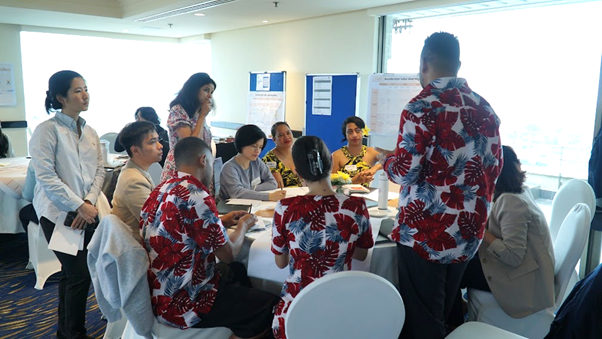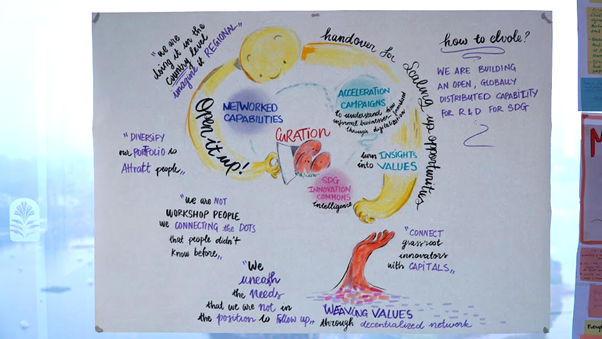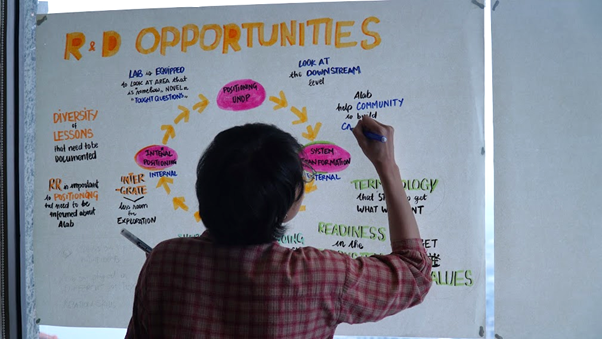The UNDP Accelerator Labs: Past, Present and Future
June 6, 2023
In March 2023, the United Nations Development Programme (UNDP) Accelerator Labs (AccLabs) of the Asia Pacific region gathered for a four-day workshop in Vietnam, to reflect of their journeys thus far - sharing the challenges and achievements experienced along the way, and how each lab has evolved individually, as well as part of the larger global network. 17 of the 91 global UNDP AccLabs representing the Asia Pacific region (Bangladesh, Bhutan, Cambodia, Fiji, India, Indonesia, Laos, Malaysia, Maldives, Mongolia, Nepal, Pakistan, Philippines, Samoa, Thailand, Timor Leste, Vietnam), convened to explore future models and direction of the network, to determine how best the AccLabs can support the accelerated achievement of the Sustainable Development Goals (SDGs).

UNDP AccLabs from across Asis & Pacific meet for the first in-person regional workshop since the network was set up in 2019
Where It All Began: Where We Are Now
The UNDP Accelerator Labs journey began in 2019 and was set up to change the way UNDP does development, tapping into local, innovative grassroots solutions and unusual partnerships, to help accelerate progress towards the SDGs. The AccLabs were designed to help UNDP navigate the fast pace and complexity of today’s development challenges by quickly testing and learning what works and what doesn’t work in sustainable development.
Four years on and there has certainly been an abundance of innovative grassroots solutions being mapped across 115 countries that the labs represent, a handful of which have been captured in the recent For Tomorrow: Grassroots Innovations documentary. The AccLabs have also brought unusual partners and approaches to the table to work on a wide range of complex development issues – from food security in the Pacific (Fiji), to pollution and waste management in Vietnam, and air quality management in India.

Documentary screening of For Tomorrow: Grassroot Innovations in Hanoi, Vietnam
While much has been discovered and achieved in the first few years of the AccLabs, innovation is a fast-evolving space, and with COVID19 restrictions finally letting up, it was time for the AccLabs to regroup, reflect, and look to the future.
Regrouping, Reflecting, Moving Forward
The UNDP Accelerator Lab Regional Workshop Asia & The Pacific consisted of facilitated sessions which looked at the past (how we evolved), future (where we want to be as a learning network), and present (what do we need to change to arrive at the desired future).

UNDP Pacific AccLab (Fiji) reflection session with fellow AccLabs from the region
By delving into the AccLabs’ journeys, the group unearthed some commonalities between labs across the various sessions. Ethnography, strategic foresight and anticipatory governance, and portfolio design were some of the top commonalities across all AccLabs’ service lines. Mutual strengths also included the relationships formed across different levels of stakeholders, from grassroots to national governments, which have enabled AccLabs to become successful conveners for diverse development challenges. By understanding what has been working to create value for the AccLabs’ respective Country Offices and UNDP, the team was able to identify important components of the lab that needed to continue in order to accelerate progress to the SDGs, as well as recognize gaps that a new evolution of the AccLabs could address.
Research & Development and Cross-Country Collaboration
The next evolution of the UNDP AccLabs is an early-stage innovation and learning network that enables and supports an open and globally distributed Research & Development (R&D) capability for the SDGs. This next evolution of the AccLabs would help to address one of the common challenges recognized by the network – scaling up actionable insights and grassroots solutions. An open and globally distributed R&D would mean the AccLabs could essentially ‘handover to the world’—successful experiments, grassroots solutions, and research discoveries which have the potential to be scaled up can then be taken up by stakeholders outside of UNDP, rather than relying solely on Country Offices’ programme/ project teams.

Exploring the next evolution of the AccLabs - looking at R&D and handover for scale
In addition to this evolution, the AccLabs are also exploring the potential of increased cross-country and regional collaboration. While the UNDP Accelerator Labs are the largest and fastest learning network on SDGs, there is much room for more focused and dedicated cross-country partnership to address specific development challenges. As a first step, the AccLabs mapped their current and future areas of work, and assessed these against fellow AccLabs within the network to determine intersects and potential for imminent collaborations.
Some of the key takeaways for the Fiji AccLab were:
the potential for regional collaboration in the areas of Circular Economy, Youth Unemployment, Digital Transformation, and Gender Mainstreaming.
the need to share learnings more widely to increase potential for upscaling experiments
the importance of continuing to push boundaries in the discovery of novel areas of development work
AccLabs’ R&D is exploring various ways of scaling (not just replication with bigger numbers) and focusing on more transformative change, alongside shaping strategic conversations within the COs and shifting gears in design from projects to portfolios.

UNDP AccLabs pinpoint R&D and regional collaboration opportunities
Evolutions aside, one thing is certain – strategic innovation is key in addressing today’s complex development challenges and essential to accelerating progress towards the SDGs in a fast-paced world.
Acknowledgements:
Alexandru Oprunenco, Bas Leurs, Gina Lucarelli, and Emily Moli.

 Locations
Locations

